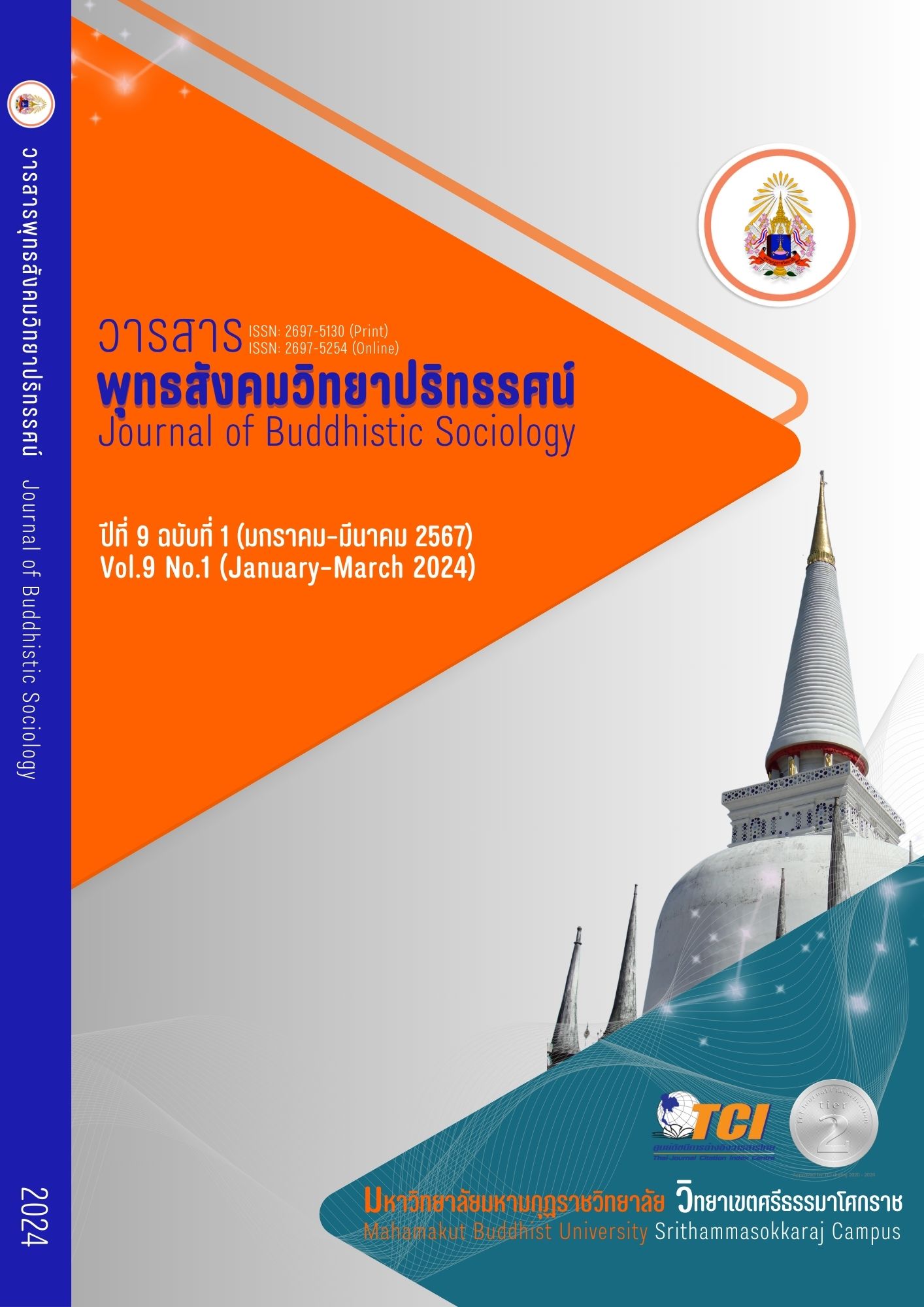ADMINISTRATION OF EDUCATION INSTITUTIONS BY USING THE KALAYANAMITDHAMMA PRINCIPLES OF SCHOOL ADMINISTRATORS ACCORDING TO THE PERCEPTION OF THE TEACHER UNDER THE SECONDARY EDUCATIONAL SERVICE NAKHON SI THAMMARAT
Main Article Content
Abstract
The research aimed to 1) study the school administration of school administrators based on the Kalyanamittadhamma principles following the perception of the teachers under the Nakhon Si Thammarat Secondary Educational Service Area Office, 2) compare the school administration of school administrators based on the Kalyanamittadhamma principles following the perception of the teachers under the Nakhon Si Thammarat Secondary Educational Service Area Office, and 3) find out the guidelines for promoting the school administration of school administrators based on the Kalyanamittadhamma principles following the perception of the teachers under the Nakhon Si Thammarat Secondary Educational Service Area Office. The sample group consisted of 337 teachers, and the sample size was determined using the Krejcie and Morgan Table. The research instrument was a questionnaire with a reliability of 0. 98. The statistics used for data analysis were frequency, percentage, mean, and standard deviation. The Statistics used for hypothesis testing were T-tests (Independent Samples) and One-Way ANOVA analysis using F-test statistics to test and compare the average of independent variables, which were more than two groups with a statistical significance 0.05.
The results of the research revealed that:
- 1. Overall, the school administration of school administrators based on the Kalyanamittadhamma principles following the teachers' perception was high. When considering each aspect, the aspect with the highest mean was the Ability to Make a Profound Statement, followed by the Do Not Leading in a Degenerate Way, Being Patient with Words, Being Loved, Being Respectable, Being Honored, and Being Smart in Speaking and Giving Advice.
- 2. Comparing opinions towards the school administration of school administrators based on the Kalyanamittadhamma principles showed that teachers of different ages had overall and individual views. The Being Respectable was different, with statistical significance at the .05 level.
- 3. The guidelines for promoting the school administration of school administrators based on the Kalyanamittadhamma principles were as follows: The administrators should pay attention to take care of all teachers and staff like family members. They should be friendly, smile, and speak politely, being a good role model in working and self-conduct. They should not interfere and induce all kinds of vices, be able to control their emotions while listening to counseling and solve problems using various methods.
Article Details

This work is licensed under a Creative Commons Attribution-NonCommercial-NoDerivatives 4.0 International License.
References
ชัยยนต์ เพาพาน. (2559). ผู้บริหารสถานศึกษายุคใหม่ในศตวรรษที่ 21. เรียกใช้เมื่อ 25 พฤษภาคม 2565 จาก http://conference.edu.ksu.ac.th/file/20160809_2488101126.pdf
บุญชม ศรีสะอาด. (2553). วิธีการทางสถิติสำหรับการวิจัย. กรุงเทพมหานคร: สุวีริยาสาสน์.
ปิยะดา ก่อวุฒิกุลรังษี. (2560). แนวทางการพัฒนาภาวะผู้นําผู้บริหารตามหลักกัลยาณมิตรธรรมโรงเรียนป้อมนาคราชสวาทยานนท์ สังกัดสำนักงานเขตพื้นที่การศึกษามัธยมศึกษา เขต 6. ใน วิทยานิพนธ์พุทธศาสตรมหาบัณฑิต. มหาวิทยาลัยมหาจุฬาลงกรณราชวิทยาลัย.
พระพรหมคุณาภรณ์ (ป.อ.ปยุตฺโต). (2560). พจนานุกรมพุทธศาสตร์ฉบับประมวลธรรม (พิมพ์ครั้งที่ 16). กรุงเทพมหานคร: เอส.อาร์.พริ้นติ้งแมสโปดักส์.
พระมหาสุธีร์วรินทร์ อินธิแสง. (2560). หลักกัลยาณมิตรธรรมของผู้บริหารในโรงเรียนประถมศึกษาในเขตพื้นที่การศึกษาประถมศึกษากรุงเทพมหานคร. วารสารวิชาการราชภัฏตะวันตก, 8(1), 5-17.
ยุภาดี ปณะราช. (2561). การพัฒนาลักษณะความเป็นกัลป์ญาณมิตรสำหรับนักศึกษาวิชาชีพครูมหาวิทยาลัยราชภัฏ. ใน วิทยานิพนธ์วิทยาศาสตรดุษฎีบัณฑิต. มหาวิทยาลัยศรีนครินทรวิโรฒ.
ศศิตา เพลินจิต. (2558). ทักษะการบริหารในศตวรรษที่ 21 ของผู้บริหารสถานศึกษาขั้นพื้นฐาน สังกัดสำนักงานเขตพื้นที่การศึกษาประถมศึกษานครปฐม เขต 1. ใน การค้นคว้าอิสระปริญญา. มหาบัณฑิต,มหาวิทยาลัยราชภัฏกาญจนบุรี.
สนธชัย ระยับสี. (2560). คุณลักษณะผู้นำแบบกัลยาณมิตรของผู้บริหารสถานศึกษา โรงเรียนเครือข่าย 58 สังกัดกรุงเทพมหานคร เขตบางกอกน้อย. ใน วิทยานิพนธ์การศึกษามหาบัณฑิต สาขาวิชาการบริหารการศึกษา. มหาวิทยาลัยบูรพา.
สำนักงานเขตพื้นที่การศึกษามัธยมศึกษานครศรีธรรมราช. (2564). ข้อมูลสารสนเทศทางการศึกษา 2564. นครศรีธรรมราช: สำนักงานเขตพื้นที่การศึกษามัธยมศึกษานครศรีธรรมราช.
สำนักงานเลขาธิการสภาการศึกษา. (2561). แผนการศึกษาแห่งชาติ พ.ศ. 2560-2579. กรุงเทพมหานคร: พริกหวานกราฟฟิค.
สุนทร โคตรบรรเทา. (2560). การบริหารการศึกษา หลักการและทฤษฎี (ฉบับปรับปรุง). กรุงเทพมหานคร: ปัญญาชน.
Krejcie, R. V. & Morgan, D. W. . (1970). Determining Sample Size for Research Scillities. Education and Phychological Measurement, 30(3), 607-610.


